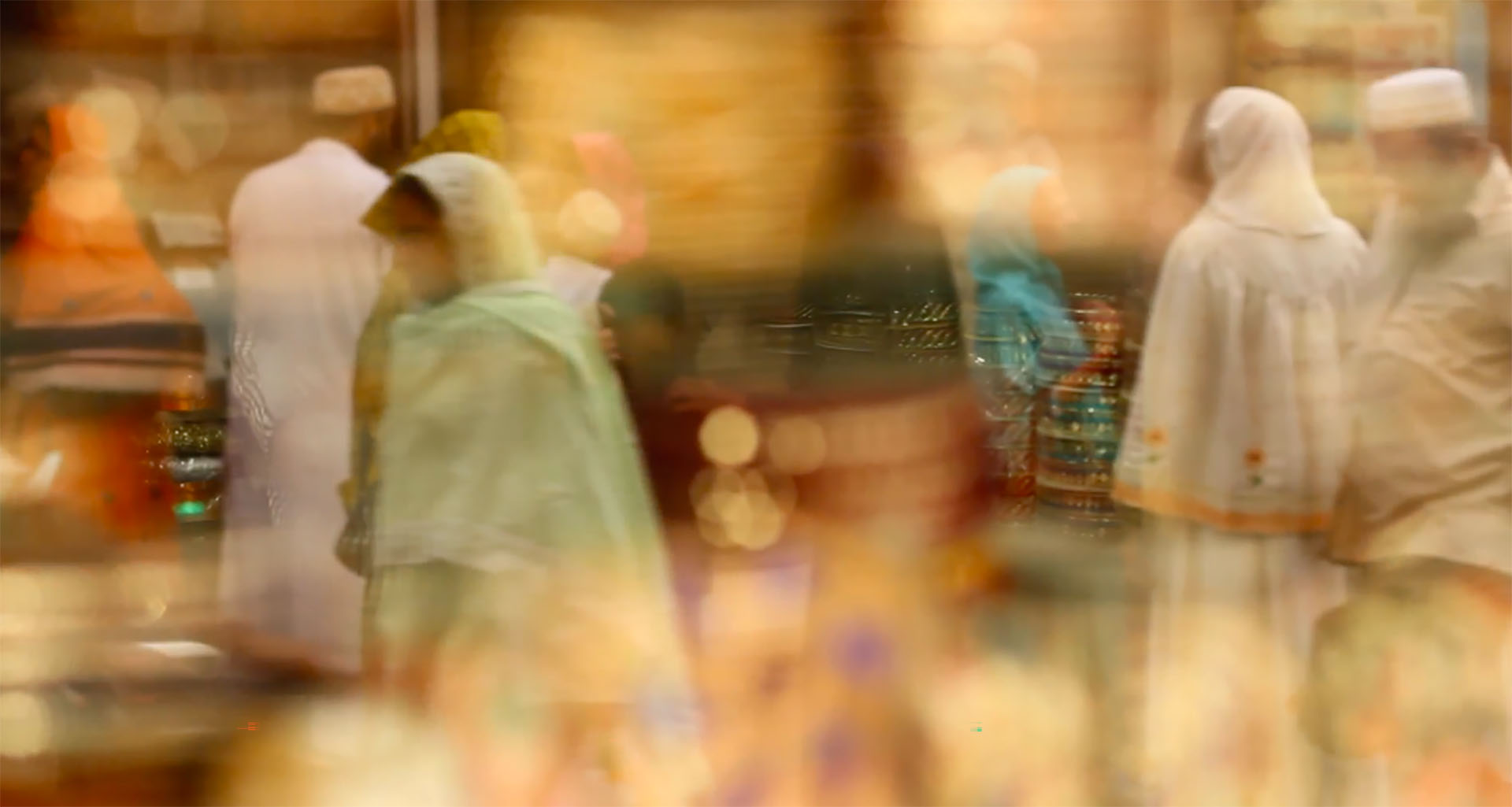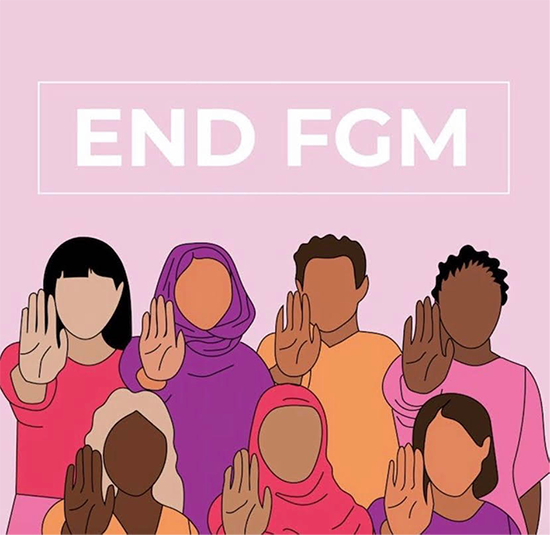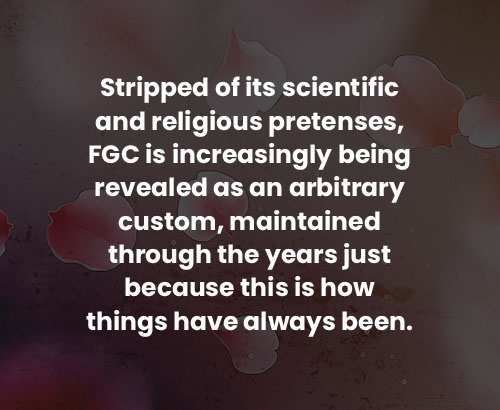I
was taken, saying that, ‘I’m going to buy you something’, to a dark room. It was a horrific experience, looking back now, that something as gory and gross took place,” a woman (identity hidden) recounts, recalling a time in her life when at age seven a part of her body was removed.
“They held my legs and took off my undergarments. I was crying very badly,” recalls another woman, her voice shaking slightly while she clears her throat.
With short, unembellished subtitles on-screen, the documentary A Pinch of Skin evokes a dark, painful memory for these unidentified women, as well as other survivors of female genital cutting (FGC) in India, as they recount their searing experience in the documentary.
In just under 27 minutes, Indian filmmaker Priya Goswami explores the phenomenon of FGC, spending time and bearing witness as they try to work through their trauma.
With each survivor, Goswami highlights a dissociation common to trauma survivors – an otherworldly feeling when narrating, remembering, and reliving the trauma.
Goswami also goes where most wouldn’t. She engages with this practice – colloquially referred to as khatna or khafz – treading sensitively and respectfully on cultural and religious ground. The documentary also affords space to communities and voices that believe in its sanctity and support its tradition.
Goswami understands that khatna is a twisted but logical end in a society where control over women’s bodies has been normalized – even among women themselves. As the film opens, Goswami tells her audience where she stands: “For this film, I have no religion. All I know is that I am born a woman and that is my only identity.”
The World Health Organization defines FGC (which it still refers to as “mutilation,” instead of the more respectful “cutting”) as “the partial or total removal of external female genitalia or other injury to the female genital organs for non-medical reasons.” But while its claims to medical or scientific legitimacy have already been debunked, over 200 million young girls are forced through the procedure each year.
FGC is, without a doubt, a direct result of a patriarchal structure that reduces women into reproductive objects, which is not restricted to one religion but is arguably a system that wants to eliminate sexuality.

In the documentary A Pinch of Skin, filmmaker Priya Goswami explores the tradition of female genital cutting in India. Through a series of interviews, Goswami bears witness to the survivors’ trauma while respectfully and sensitively examining the religious and cultural background of the practice. (Screenshot courtesy of Priya Goswami)
From mullanis to medical doctors
FGC is commonly recognized as prevalent in Africa while other communities that also practice it have flown under the radar. In India, for example, FGC remains routine among Dawoodi Bohra Muslims, a minority group that follows Shiite Islam.
In these communities, khatna used to be traditionally performed by practitioners called mullanis – traditional cutters – as a coming-of-age ritual for girls as young as 7. Over the years, medical practitioners, mostly Bohra doctors, have replaced the mullanis, and in the process, have medicalized khatna.
Troublingly, FGC has spread far beyond these small, fringe communities, the practice expanding across the world, even reaching some of the most cosmopolitan nations. Dawoodi Bohras have settled in more than 40 countries across the globe, with significant diaspora populations in Europe, North America, East Asia, and East Africa.
In turn, recent research has confirmed that khatna has become commonplace in these regions, making it a global concern. Despite being condemned under several United Nations declarations – including the Universal Declaration of Human Rights and the UN Convention on the Rights of the Child – FGC remains legal in many countries.
The globalization of khatna, however, has also inspired a more nuanced dialogue around FGC, particularly as it relates to the complexities of religious norms.
In 2017, an extensive study published by the non-profit Sahiyo outlined the complications and consequences of khatna as a result of trauma to the vagina, eventually also compromising mental health.
As an organization, Sahiyo works to empower Asian communities to rise up against FGC. In their report, they point out that the main reason behind the practice is to dampen sexual arousal in women by operating on the vagina’s main pleasure point, the clitoris.
Sahiyo’s research also reveals how khatna persists within a community. The practice, they say, involves much more than the doctor and the young girl: the families, neighbors, and onlookers who stay silent, and generations of people who have accepted it as normal. Almost literally, it takes a village to keep this tradition alive.
Indeed, community members and pro-khatna activists argue along the lines of normalcy. Like in men, they say, FGC is simply female circumcision. It may even be healthy for reproductive health, they claim. Besides, this is a sacred mandate for them, a rite of passage for all women.
But notable Islamic groups have pushed back against this practice. The humanitarian aid and development agency Islamic Relief Worldwide, for example, has publicly denied the religious impetus behind FGC. Instead, they point to a chapter from the Quran on women’s rights; advocating for women’s health and bodily agency, they say, is the right thing to do.
Stripped of its scientific and religious pretenses, FGC is increasingly being revealed as an arbitrary custom, maintained through the years just because this is how things have always been.

Digital activism, ethical AI
Organizations like Sahiyo, along with the boom of the internet and digital advocacy, have paved the way for innovative and unconventional thinking around khatna. The discourse around the practice has now gone beyond a socio-cultural history, and involves an objective and realistic engagement with the community.
In a podcast with global youth organization Scarlet Udaan, Sahiyo co-founder Mariya Taher unpacks the FGC discourse in the United States, pointing out that placing khatna within an American context requires analyzing the xenophobia and islamophobia that influence Muslims existing in white societies. The discrimination that surrounds them deepens their silence, making it more difficult to encourage dialogue.
But as it opens up more avenues for awareness and sensitive engagement, the digital realm can also be overwhelming. To tackle this, Goswami the filmmaker and journalist Aarefa Johari came together to develop an Artificial Intelligence app that would bridge the gap between community dialogue and technology.
Mumkin: making difficult conversations possible is Goswami and Johari’s first venture into the AI world. Drawing from these two women’s nearly a decade’s worth of advocacy work, the app provides a safe space for survivors, families, and other interested folk.
Using AI bots programmed to play a mother and husband, Mumkin helps users learn the language around trauma, violation, and consent, empowering them to have these conversations in real life. The dialogues are entirely survivor-led.
The app is an exercise in ‘ethical AI for social change,’ acknowledging the growing concerns with AI technology and privacy while making space for diversity in user experience.
Online activism can also cross the digital boundaries and translate into concrete, real-life action. In 2016, an online petition led by Masooma Ranalvi, a publisher and FGC survivor, drew the support of just 17 Bohra women who also shared the desire to end the practice. Today, over 200,000 people have signed on to the petition.
This initiative sparked outrage across India, inspiring news reports and research around the tradition and human rights violations. In 2017, buoyed by the strong public support, Delhi-based lawyer Sunita Tiwari filed a public interest litigation (PIL) seeking to ban FGC in the country.
 The Ministry of Women and Child Development, in response to the PIL, admitted that they had “no official data or study which supports the existence of FGM in India.”
The Ministry of Women and Child Development, in response to the PIL, admitted that they had “no official data or study which supports the existence of FGM in India.”
The first-ever systematic investigation of FGC in the country was conducted thereafter, but the PIL remains stuck in courthouse files. Meanwhile, the practice persists in India although banned in many countries.
While the legal fight against FGC is ongoing in India, the global resistance to FGC goes beyond the push for legislation outlawing FGC. In the absence of physical outreach, especially during the COVID-19 pandemic, digital activism has gained traction. As young girls become more educated, they also become increasingly aware of gender-based violence.
In A Pinch of Skin, a young woman expresses this empowered worldview. “It’s unacceptable at various levels,” she says of FGC.
“The preservation of a certain kind of marriage or the fact that people should have certain kinds of virtues… For the sake of all that, you just take the liberty of cutting off a little girl’s clitoris,” she adds. “You are inhibiting another person’s sexuality for very, very heinous reasons.” ●
Saachi D’Souza is a freelance writer and researcher based in India. She has been writing on gender, mental health, and caste in South Asia by examining film, culture, and conversations.



















